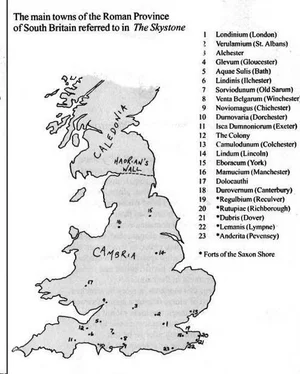There was nothing I could say to that. It was none of my affair, and I had no wish to be inquisitive. I accepted his words and passed no comment. After a time he spoke again.
"Home to Britain!" His voice sounded nostalgic. "All that greenery after all this sand. How much do you know about the Twentieth?" I shook my head. "Nothing, except that they're famous. They've been called the Valeria Victrix since the days of Julius Caesar, and their legionary fortress has been at Deva, in Cambria, since Agricola's campaign, about three hundred years ago. Apart from that, I only know I'm posted to the Second Millarian Cohort as replacement for its pilus prior. Apparently the man they had was killed and there's no one really qualified to replace him from the existing crew. They have an acting cohort commander in place until I get there." I grimaced to myself in the darkness. "Frankly, I'm not sure what that means, so I'm expecting the worst, in the hope that anything less than that will be bearable. The only other thing is that I've heard they're not currently stationed in Deva — the Second Cohort, I mean. They're in the north-east, at Eboracum."
"The Second of the Twentieth, eh?" Even in the dark, I could see the smile on his face as he shook his head.
"What's so funny? What are you smiling at?"
He was grinning strangely to himself. "I was just thinking about our circumstances here," he said. "You are here because of my enemy, even though indirectly, and you have saved my life. Yet your mode of address to me is decidedly lacking in military respect, and I'm not sure what I ought to do about it."
I stiffened at the censure in his voice. He was right, of course. I was only a centurion and he was a Military Tribune, and my deportment had not been militarily correct. But somehow, because of our circumstances, it had not seemed necessary to defer to him here in the middle of a desert when there were only the two of us around. Now it appeared that I had been wrong in my reading of the man. He was more of a martinet than I had thought. He must have read my mind, for he swung his camel right around close to mine, a broad smile on his face.
"Relax, Varrus. We're going to get along, you and I. This meeting was obviously fated. My name is Caius Britannicus. I, too, was on my way to Britain when I was taken. To the Second Cohort of the Twentieth Legion. I'm your new commanding officer. Haven't I got a right to wonder what I'm going to do about you?"
II
For a period of weeks after the trap in the mountain pass, my whole world existed only in terms of the pain of my wound. Even now it is hard to describe. As a veteran, and the bearer of many scars picked up over years of duty in some savage places, I had thought myself familiar with pain. I was wrong. This experience of muscle and tendons and sinew shattered by the ripping spike of a hard-swung axe taught me just how little I had known. The pain I lived with had a wide range of intensity and textures, and I experienced it as a spectrum of pulsating colours, ranging from blazing white to a dull, harsh, throbbing red.
Of all the torments I had to endure, the worst by far was caused by the natural, waste-producing functions of my own body. They became my most bitter and treacherous enemy, scourging me with unimaginable agonies each time I had to accommodate them. Mitros was gentle in his ministrations at such times, but not always sympathetic. On one occasion — he was in a particularly impatient mood — he told me brusquely that women endured far worse in childbirth and I should be grateful I was alive to feel pain. But it was only his skills and his magical opiates that saved my mind from breaking during that first month.
Pain, however, like everything else in life, is transient. I began to mend, gradually, day by day, heartbeat by heartbeat. A time came when I could lie still and feel — almost explore — my pain, without wanting to scream like a baby. And a day came, much later, when I could lie on my back and think about things other than how much I hurt. From that point on, I began to mend visibly, and to talk, and to think rationally again. I spent many silent hours reviewing and analyzing the affinity between Britannicus and me, and how it had developed and prospered after our meeting in Africa.
We had travelled back to Britain together, and by the time we disembarked at Lemanis in South Britain, each of us had a sound measure of the other's capacities. I was comfortable with the relationship we had established — one of Staff officer and trusted subordinate — and I felt confident that Britannicus was, too.
From Lemanis, we rented horses and made our way directly north to Londinium, the administrative centre of South Britain. There we reported to the Military Governor, to present our papers and gain official acknowledgement of our arrival. No one in Londinium had any time to waste with us. We were sent on our way — almost without rest — with a package of personal dispatches, a thirty-strong squadron of light cavalry under the command of a senior decurion, and an infantry detachment of one hundred and twelve replacements with six junior centurions. All of these the Tribune was instructed to deliver to the senior Legate in Deva, the fortress headquarters of the Twentieth Valeria Victrix for more than three centuries. We had expected to be sent directly to Eboracum where the Second Cohort of the Twentieth had been stationed on temporary duty for several years. The official military mind, however, continued to function in its own peculiar way.
Deva lay in the hill country to the north-west, in Cambria. It had been built around 70 AD, during Julius Agricola's campaign to complete the conquest of Britain. Its site had been chosen because it dominated the territory where the lands of three warlike tribes — the Brigantes, the Deceangli and the Ordovices — came together. However, after three hundred years of the Pax Romana, Deva's original strategic importance had long been forgotten. Its location was now no more than damnably inconvenient. It took us five days of hard marching to make the journey there by road from Londinium.
As a fortress, Deva was impressive and seemingly impregnable, exactly as one would expect after three hundred-odd years of continuous occupation by one of Rome's proudest and oldest legions. We had less than one day to absorb it, however, before our orders took us back to the road again.
We learned immediately upon our arrival that our initial intelligence —
acquired in Africa — had been accurate. The Second Cohort of the Twentieth lay at Eboracum, on temporary duty with the Second Legion, the Augusta, another three days' march to the north-east. The Legate who accepted our formal reporting for duty was surly and ill-tempered. He excoriated both of us mercilessly for having taken so long to get there —
apparently we had been expected the previous week — and sent us on our way with ringing ears. My admiration for Britannicus grew as I watched the uncomplaining manner in which he accepted the injustice and the inefficiency and inconvenience being heaped upon him by incompetent superiors.
From the outset of our relationship Britannicus invariably treated me with military correctness, slightly warmed by courtesy and consideration. I found him to be just, temperate, and dispassionate in his dealings with the men under his command. But he could be awesome in his wrath when provoked by incompetence or malfeasance. A rigid disciplinarian, he was implacable once he had decided that punishment was in order. And never, at any time, did he show any capacity for suffering fools gladly. In those days, Britain had been at peace for many years. Legionary duties consisted, in the main, of road-building and maintenance, policing the province, and maintaining civil order. The army was, as it always was, the enforcing power behind the law. Few circumstances called the troops in Britain out to spill blood: occasionally, raiding bands of Picts from Caledonia or Scots from Hibernia would make incursions into provincial territory and would have to be repulsed, or, much less common, uninvolved units would be called out to put down an army mutiny bred of anger, dissatisfaction, lack of discipline and the tedium of garrison life. The Second Cohort's posting to Eboracum had come as the result of a mutiny. The rebellion had been a deep-rooted one. and the thousand-man Second of the Twentieth, the only uncontaminated cohort in Eboracum, had been detained there by an apprehensive praesidium for almost two years.
Читать дальше









